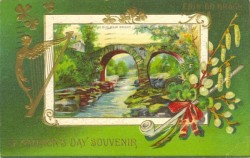When was the first St. Patrick’s Day Parade held in NYC?
 March 17, 1762 — Today marks the anniversary of the first St. Patrick’s Day Parade in New York City.
March 17, 1762 — Today marks the anniversary of the first St. Patrick’s Day Parade in New York City.
The Charitable Irish Society of Boston organized the first observance. But the celebration was not Catholic in nature, as Irish immigration to the colonies had been dominated by Protestants.
New York’s first Saint Patrick’s Day observance was similar to the one held in Boston on March 17, 1762 in the home of John Marshall, an Irish Protestant. The first documented St. Patrick’s Day Celebration in Philadelphia was held in 1771. And, while camped in Morristown, NJ, General Washington allowed his troops a holiday on March 17, 1780 “as an act of solidarity with the Irish in their fight for independence.” This event became known as The Saint Patrick’s Day Encampment of 1780.
Who was Saint Patrick? Born in the late 4th century, Saint Patrick was one of the most successful Christian missionaries in history. He was taken prisoner at the age of 16 by a group of Irish raiders who attacked his family’s estate. They transported him to Ireland, and he spent six years in captivity before escaping back to Britain. Believing he had been called by God to Christianize Ireland, he joined the Catholic Church and studied for 15 years before being consecrated as the church’s second missionary to Ireland. Patrick began his mission to Ireland in 432, and by his death in 461, the island was almost entirely Christian.
Sources
Words of Wisdom
The general congratulates the army on the very interesting proceedings of the parliament of Ireland and the inhabitants of that country which have been lately communicated; not only as they appear calculated to remove those heavy and tyrannical oppressions on their trade but to restore to a brave and generous people their ancient rights and freedom and by their operations to promote the cause of America.
Desirous of impressing upon the minds of the army, transactions so important in their nature, the general directs that all fatigue and working parties cease for tomorrow the seventeenth, a day held in particular regard by the people of the nation. At the same time that he orders this, he persuades himself that the celebration of the day will not be attended with the least rioting or disorder, the officers to be at their quarters in camp and the troops of the state line to keep within their own encampment.





